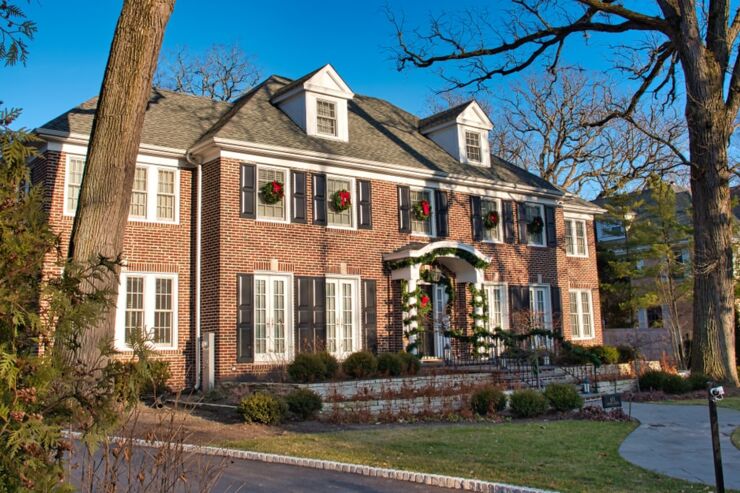A luxury mansion in Surrey, U.K., made waves last week when it was listed for sale, given how closely its exterior resembles the legendary McCallister family home from the 1990 hit Christmas film Home Alone, starring Macauley Culkin.
Of course, the 'real' Home Alone property is on the other side of the Atlantic in the affluent Chicago suburb of Winnetka, a stone's throw from Lake Michigan. Built in 1920, the Georgian-style property was instantly a hit with the film’s fans, who were delighted by the house's symmetrical facade, elegant brick exterior and imposing portico. Only the exterior of the Winnetka home was used for shooting the movie: interiors were actually constructed in stage sets to facilitate filming.
The UK's lookalike property is ultra-modern, having been built in 2019. It is situated in Cobham, 17 miles south-west of London and around 40 minutes via rail from London Waterloo. The luxury of the Cobham property outstrips the Chicago 'original' by some margin, hitting the market at £7 million (the Chicago property featured in the film has an estimated value of around $2.3 million).
On the prestigious Oxshott Way Estate (one of four private estates in Cobham), which gives security and privacy, the UK property will likely attract international and local attention, given the easy access to London from the Stoke D'Abernon train station, which is just a few minutes away. With Chelsea Football Club's training ground less than a 5-minute drive away from the house, the property could also attract attention from any of the club's football players looking to move.
While the front facades of both homes are similar, the Cobham property is nearly three times larger than the Home Alone original. It has seven bedrooms, nine bathrooms, its own cinema, wine cellar, heated pool, bar, games room and - crucially - a state-of-the-art security system to keep out the likes of The Wet Bandits featured in the movie.
The property has solar panels to provide a sustainable energy source for the home and has underfloor heating and air conditioning, as well as a smart home system and accompanying appliances.
Lenders And Financing multi-million-pound properties
The UK's high street lenders increasingly offer very large mortgages, especially in the UK's main cities like London, Liverpool, Leeds, Bristol, Birmingham and Manchester, and some prime hotspots with liquid and buoyant property markets outside the UK's largest cities. Cobham - a popular and affluent commuter town, is likely to be one of such hotspots where high street banks will lend against high-value and prime property. However, the 'UK's Home Alone' property comes with a price tag of £7 million, which will almost certainly be too large for most high street lenders to consider.
Large mortgages and financing for prime property worth £3 million or more tend to sit firmly in the league of private banks and boutique lenders. This is because, despite their considerable wealth, prime property buyers don't usually fit the relatively narrow 'ideal borrower' criteria that best suit high street banks, who often cater to the lower and middle mortgage market rather than luxury real estate buyers who typically need much bigger mortgages.
Wealth often means complexity
Wealthy borrowers buying luxury property tend to have what high street lenders will view as unusual income: an asset base made up of multiple asset classes (some of which may be relatively illiquid), multiple income streams, multicurrency income, income generated via rental properties, or they may be asset rich but have little day-to-day liquidity. Private banks and boutique lenders can also work with borrowers who generate income or have made their wealth from legitimate but uncommon sources such as gaming, emerging tech, cryptocurrency, blockchain, AI, robotics, etc. High street banks often can't assess these borrowers effectively and, therefore, can't always offer mortgages. In contrast, private banks and boutique lenders write loans on a case-by-case basis, taking a holistic view of the borrower and their financial situation, risk, wealth, loan-to-value ratio, desired mortgage product, and so on. As a result, they can consider offering mortgages in scenarios where high-street banks can't.
To purchase a property of £7 million, the buyer will already have significant wealth and likely have a solid and diverse asset base, possibly in and outside the UK. Because of this, any property finance will probably facilitate the buyer's long-term financial position, optimising cash flow and allowing them to retain liquidity rather than plunge a significant amount of cash into a single, relatively illiquid asset.
As long as they have a solid financial position, the buyer is likely to have their choice of lenders and types of mortgage. However, negotiation is always necessary to secure the best possible rate, as few lenders offer their absolute best rates and terms immediately. Instead, when they understand more about the quality of the borrower (a borrower that is more liquid than might initially be evident, for example) or any upsides (a borrower that can place assets under management or that will have a significant liquidity event in the medium term) more competitive and completely tailored mortgages can usually be negotiated, which is Enness' specialisation.
Optimising cash flow and retaining liquidity is often important
Interest-only mortgages are popular for prime property purchases and may be a consideration for a buyer of the Cobham property. Here, the owner would, initially, only have to make payments on the interest due on the mortgage before paying off the principal loan amount. Because interest-only mortgages see buyers only pay interest (rather than capital and interest as is generally the case) for a predefined period, monthly payments are usually cheaper than traditional mortgage equivalents. This makes them popular with wealthy buyers who want to optimise cash flow and retain liquidity, especially as these individuals can generally pay off the principal easily.
A high-net-worth exemption mortgage is also likely possible for a prospective buyer, given the property's price, which would only make it accessible to high-net-worth individuals. Most UK mortgages are regulated, and lenders need to ensure that borrowers meet certain affordability criteria. However, many high-net-worth individuals don't meet affordability rules for various reasons: they may have a significant net worth but relatively little day-to-day liquidity, sporadic income or multicurrency income, for example. If a borrower meets the criteria to be eligible for a high-net-worth exemption mortgage, lenders (usually private banks and smaller, bespoke lenders) can offer a mortgage based on the borrower's overall net worth and assets rather than income. This often opens up the path to a large mortgage when a borrower might not otherwise meet affordability criteria.
Get In Touch
Whilst not every property resembles one that has starred in a major Hollywood movie, we know every property and every purchase are genuinely unique. Enness specialises in arranging large mortgages and property finance for high-net-worth individuals and borrowers with complex or unusual backgrounds, as well as those who have specific requirements for a mortgage.
To learn more about Enness’ expertise in arranging high-value mortgages, get in touch and our team will walk you through any questions you have and talk over your options.
The views and opinions expressed in this piece are those of the author. They do not constitute advise or a recommendation and do not necessarily reflect the official policy or position of Enness. They are not intended to indicate any market or industry viewpoints, or those of other industry professionals.





